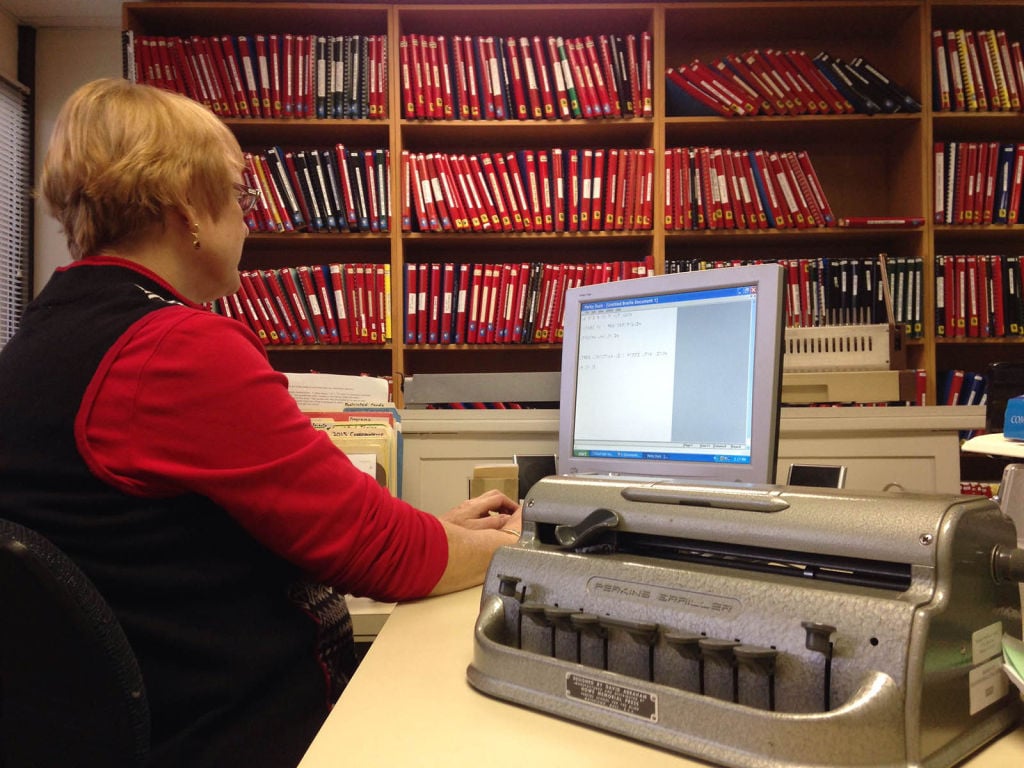
Patricia Herrling types in the Segoe Road office of Braille Library and Transcribing Services; in the foreground is an early Perkins Brailler.
In the end, it proved easier for Barb Schlinkert to transcribe Rachael Ray’s cookbook into braille than actually make any of the recipes.
The book is titled “My Year in Meals and My Year in Cocktails” — a friend suggested Ray share favorite dishes from her own kitchen — and as you might guess, Ray doesn’t make a lot of grilled cheese sandwiches. The ingredient list alone was daunting.
“You’ll use every pot and pan,” Schlinkert said last week.
But thanks to Schlinkert’s work earlier this year, blind and visually impaired people with flair and ambition in the kitchen can access Ray’s recipes, including the boiled meat, carrots, organic rice, extra virgin olive oil and parsley that Ray makes for Isaboo, her pit bull.
Cookbooks are among the most popular volumes transcribed into braille by the Madison-based Braille Library and Transcribing Services (BLTS), a largely volunteer organization that began more than four decades ago, currently has more than 2,000 titles in its lending library (books are sent all over the country), while still longing for a higher local profile.
“We’re Madison’s best-kept secret,” Carol Birch, a volunteer braillist, said recently.
“I don’t know if we’re the best-kept secret,” her friend, Patricia Herrling, said. Herrling is the lending library coordinator for BLTS. The two women were having coffee.
“Jolly nearly,” Birch, who is originally from Rugby, England, said.
Schlinkert, who transcribed the Ray book, has been a volunteer with BLTS for the past decade. Any aspiring braillist must take a year-long series of lessons and then submit 35 pages of braille — the raised dot configurations that allow blind people to read with their fingers — to the National Library Service of the Library of Congress. With a passing score — the standards are rigorous — the braillist is certified.
“It’s the hardest thing I’ve ever done,” Schlinkert said, but also among the most rewarding.
“I’ll see someone walking with a white cane,” Schlinkert said, “and I’ll wonder if they are a client of the library. If maybe they’ve read a book I’ve done.”
One of the many interesting aspects of BLTS is its history. It was incorporated as Volunteer Braillists and Tapists in 1971, but in fact the real beginning was several years earlier, when four alumni members of the Delta Gamma sorority at UW-Madison — Harriet Boldon, Margot Aserlind, Sue Clark and Betty Land —volunteered to help a Lakewood Elementary School teacher with her classes for blind children.
It was pretty slow going until 1970, when a woman named Marion Hong moved to Madison from Minneapolis, her husband, Richard, having joined the faculty of the University of Wisconsin Medical School.
Hong had a decade’s worth of experience teaching braille, and soon joined forces with the Delta Gamma four.
At the incorporation meeting in 1971, Aserlind was named treasurer, because she produced the treasury — a $5 bill. The first classes were in the basement of the bank at Hilldale (and, later, at the Monroe Street library, and Crestwood School). Whatever the surroundings, Hong’s passion and professionalism pushed them forward.
“When Marion Hong was teaching our class,” Florence Poole, an early volunteer from the Poole restaurant family, recalled later, “if there were a certain number of errors on a page, you did the whole page over.”
Poole remembered making an error, and trying to cover it up. When it was returned, there was this in the margin, from Hong’s colleague, Shirley Ross: “You can never, never, never fool an old proofreader.”
Last week, still in Madison, Poole recalled transcribing several children’s books for a woman from the American South who had a blind grandchild. Clear braille strips pasted on the pages allowed them to read together.
The grandmother, thrilled, kept requesting more books.
“I’m prouder of that than anything I’ve done,” Poole said of her years as a braillist. “That, and having a baby. They were equally hard.”
Herrling became a braillist six years ago when she retired as a UW-Madison librarian.
“The worst thing I could imagine was not being able to read,” Herrling said. On retiring, “the first thing I did was sign up for classes. My teacher, Betty Oakley, was wonderful.”
BLTS now has an office on North Segoe Road, and two paid employees. Proofreaders, who are blind, are paid, too. Over the years BLTS has trained some 200 volunteer braillists, and other volunteers do audio books. Fundraising to support the organization is ongoing, greatly needed, and greatly appreciated.
More than four decades on, the spirit of the pioneers endures.
Marion Hong, who came to town in 1970 and lit a fire under everyone, died in 2012, having moved back to her native New England 20 years earlier.
An item from the group’s newsletter, called Dear Pearl, wryly recognized Hong’s contribution, at the time she stepped aside from regular teaching:
“Marion is neither gone nor forgotten. We have simply bronzed her bull whip and moved her upstairs to the Board.”
Contact Doug Moe at 608-252-6446 or dmoe@madison.com. His column appears Monday, Wednesday, Friday and Sunday.
Be the first to know
Get local news delivered to your inbox!